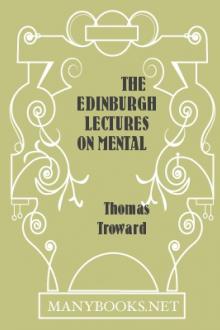The Edinburgh Lectures on Mental Science - Thomas Troward (best time to read books .txt) 📗

- Author: Thomas Troward
- Performer: -
Book online «The Edinburgh Lectures on Mental Science - Thomas Troward (best time to read books .txt) 📗». Author Thomas Troward
For the purpose, then, of getting into touch with our sub-conscious mind we must endeavour to think of ourselves as pure being, as that entity which interiorly supports the outward manifestation, and doing so we shall realize that the essential quality of pure being must be good. It is in itself pure Life, and as such cannot desire anything detrimental to pure Life under whatever form manifested. Consequently the purer our intentions the more readily we shall place ourself en rapport with our subjective entity; and a fortiori the same applies to that Greater Sub-conscious Mind of which our individual subjective mind is a particular manifestation. In actual practice the process consists in first forming a clear conception in the objective mind of the idea we wish to convey to the subjective mind: then, when this has been firmly grasped, endeavour to lose sight of all other facts connected with the external personality except the one in question, and then mentally address the subjective mind as though it were an independent entity and impress upon it what you want it to do or to believe. Everyone must formulate his own way of working, but one method, which is both simple and effective is to say to the subjective mind, "This is what I want you to do; you will now step into my place and do it, bringing all your powers and intelligence to bear, and considering yourself to be none other than myself." Having done this return to the realization of your own objective personality and leave the subjective mind to perform its task in full confidence that, by the law of its nature, it will do so if not hindered by a repetition of contrary messages from the objective mind. This is not a mere fancy but a truth daily proved by the experience of increasing numbers. The facts have not been fabricated to fit the theory, but the theory has been built up by careful observation of the facts; and since it has been shown both by theory and practice that such is the law of the relation between subjective and objective mind, we find ourselves face to face with a very momentous question. Is there any reason why the laws which hold good of the individual subjective mind should not hold good of the Universal Mind also? and the answer is that there is not. As has been already shown the Universal Mind must, by its very universality, be purely subjective, and what is the law of a part must also be the law of the whole: the qualities of fire are the same whether the centres of combustion be great or small, and therefore we may well conclude these lectures by considering what will be the result if we apply what we have learnt regarding the individual subjective mind to the Universal Mind.
We have learnt that the three great facts regarding subjective mind are its creative power, its amenableness to suggestion, and its inability to work by any other than the deductive method. This last is an exceedingly important point, for it implies that the action of the subjective mind is in no way limited by precedent. The inductive method works on principles inferred from an already existing pattern, and therefore at the best only produces the old thing in a new shape. But the deductive method works according to the essence or spirit of the principle, and does not depend on any previous concrete manifestation for its apprehension of it; and this latter method of working must necessarily be that of the all-originating Mind, for since there could be no prior existing pattern from which it could learn the principles of construction, the want of a pattern would have prevented its creating anything had its method been inductive instead of deductive. Thus by the necessity of the case the Universal Mind must act deductively, that is, according to the law which has been found true of individual subjective mind. It is thus not bound by any precedent, which means that its creative power is absolutely unlimited; and since it is essentially subjective mind, and not objective mind, it is entirely amenable to suggestion. Now it is an unavoidable inference from the identity of the law governing subjective mind, whether in the individual or the universal, that just as we can by suggestion impress a certain character of personality upon the individual subjective mind, so we can, and do, upon the Universal Mind; and it is for this reason that I have drawn attention to the inherent personal quality of pure spirit when contemplated in its most interior plane. It becomes, therefore, the most important of all considerations with what character we invest the Universal Mind; for since our relation to it is purely subjective it will infallibly bear to us exactly that character which we impress upon it; in other words it will be to us exactly what we believe it to be. This is simply a logical inference from the fact that, as subjective mind, our primary relation to it can only be on the subjective plane, and indirectly our objective relations must also spring from the same source. This is the meaning of that remarkable passage twice repeated in the Bible, "With, the pure thou wilt show thyself pure, and with the froward thou wilt show thyself froward." (Ps. xviii., 26, and II. Sam. xxii., 27), for the context makes it clear that these words are addressed to the Divine Being. The spiritual kingdom is within us, and as we realize it there so it becomes to us a reality. It is the unvarying law of the subjective life that "as a man thinketh in his heart so is he," that is to say, his inward subjective states are the only true reality, and what we call external realities are only their objective correspondences. If we thoroughly realize the truth that the Universal Mind must be to us exactly according to our conception of it, and that this relation is not merely imaginary but by the law of subjective mind must be to us an actual fact and the foundation of all other facts, then it is impossible to over-estimate the importance of the conception of the Universal Mind which we adopt. To the uninstructed there is little or no choice: they form a conception in accordance with the tradition they have received from others, and until they have learnt to think for themselves, they have to abide by the results of that tradition: for natural laws admit of no exceptions, and however faulty the traditional idea may be, its acceptance will involve a corresponding reaction upon the Universal Mind, which will in turn be reflected into the conscious mind and external life of the individual. But those who understand the law of the subject will have no one but themselves to blame if they do not derive all possible benefits from it. The greatest Teacher of Mental Science the world has ever seen has laid down sufficiently plain rules for our guidance. With a knowledge of the subject whose depth can be appreciated only by those who have themselves some practical acquaintance with it, He bids His unlearned audiences, those common people who heard Him gladly, picture to themselves the Universal Mind as a benign Father, tenderly compassionate of all and sending the common bounties of Nature alike on the evil and the good; but He also pictured It as exercising a special and peculiar care over those who recognize Its willingness to do so:--"the very hairs of your head are all numbered," and "ye are of more value than many sparrows." Prayer was to be made to the unseen Being, not with doubt or fear, but with the absolute assurance of a certain answer, and no limit was to be set to its power or willingness to work for us. But to those who did not thus realize it, the Great Mind is necessarily the adversary who casts them into prison until they have paid the uttermost farthing; and thus in all cases the Master impressed upon his hearers the exact correspondence of the attitude of this unseen Power towards them with their own attitude towards it. Such teaching was not a narrow anthropomorphism but the adaptation to the intellectual capacity of the unlettered multitude of the very deepest truths of what we now call Mental Science. And the basis of it all is the cryptic personality of spirit hidden throughout the infinite of Nature under every form of manifestation. As unalloyed Life and Intelligence it can be no other than good, it can entertain no intention of evil, and thus all intentional evil must put us in opposition to it, and so deprive us of the consciousness of its guidance and strengthening and thus leave us to grope our own way and fight our own battle single-handed against the universe, odds which at last will surely prove too great for us. But remember that the opposition can never be on the part of the Universal Mind, for in itself it is sub-conscious mind; and to suppose any active opposition taken on its own initiative would be contrary to all we have learnt as to the nature of sub-conscious mind whether in the individual or the universal; the position of the Universal Mind towards us is always the reflection of our own attitude. Therefore although the Bible is full of threatening against those who persist in conscious opposition to the Divine Law of Good, it is on the other hand full of promises of immediate and full forgiveness to all who change, their attitude and desire to co-operate with the Law of Good so far as they know it. The laws of Nature do not act vindictively; and through all theological formularies and traditional interpretations let us realize that what we are dealing with is the supreme law of our own being; and it is on the basis of this natural law that we find such declarations as that in Ezek. xviii., 22, which tells that if we forsake our evil ways our past transgressions shall never again be mentioned to us. We are dealing with the great principles of our subjective being, and our misuse of them in the past can never make them change their inherent law of action. If our method of using them in the past has brought us sorrow, fear and trouble, we have only to fall back on the law





Comments (0)